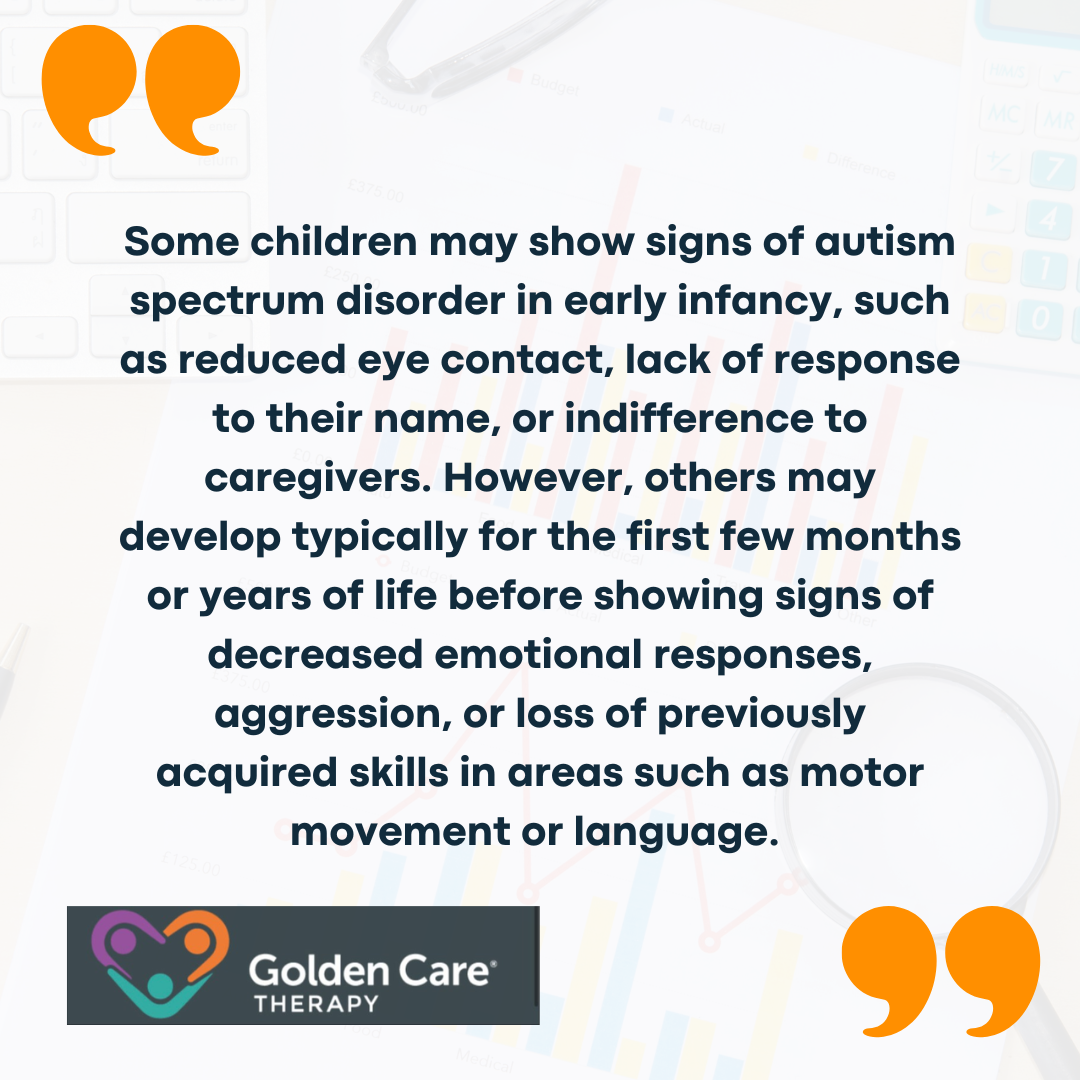Recognizing the early signs and symptoms of autism is crucial for early intervention and support. While autism can manifest differently in each individual, there are some common behaviors that may indicate a child is on the autism spectrum.
These early signs may include the following:
- Not responding to their name by 12 months
- Avoiding eye contact
- Delayed speech development
- Preferring to play alone
- Repetitive behaviors, such as hand flapping or spinning objects
- Sensory sensitivities, such as being overly sensitive to loud noises or certain textures
It is important to note that not all children who display these behaviors have autism, but if there are concerns about a child’s development or if there is a loss of skills at any age, it is recommended to consult a doctor for further evaluation.

How to Recognize Autism in Children
Recognizing the signs of autism in children is essential for early intervention and support. Autism Spectrum Disorder (ASD) can manifest differently in young children compared to older children.
Understanding these signs and seeking professional diagnosis and support is crucial for the well-being of the child and their family.
Signs in Young Children
In young children, there are several early signs that may indicate the presence of autism. It’s important to note that these signs can vary from child to child. Some common signs include:
- Lack of eye contact
- Limited or no response to name
- Delayed speech development
- Repetitive behaviors
- Preference for solitary play
- Sensory sensitivities
These signs may not necessarily indicate autism on their own, but if you notice several of these behaviors in your child, it is important to consult with a healthcare professional for further evaluation and guidance.
Signs in Older Children
As children with autism grow older, there are additional signs that may become more apparent. Some signs of autism in older children include:
- Difficulty with social interactions
- Challenges with emotional understanding
- Repetitive behaviors and intense interests
- Sensory sensitivities
- Language and communication difficulties
- Executive functioning challenges
If you observe these signs in your older child, it is crucial to seek a professional evaluation to determine whether autism may be a contributing factor.
Signs in Toddlers
In toddlers, there are several red flags that may indicate the presence of autism. These signs can include:
- Not responding to their name by 12 months
- Avoiding eye contact
- Delayed speech development
- Preferring to play alone
It’s important for parents and caregivers to pay attention to these behaviors and consult a doctor if there are concerns about a child’s development or if there is a loss of skills at any age.
Early identification and intervention can make a significant difference in the child’s development and quality of life.

Behavioral Indicators of Autism
There are certain behavioral indicators that parents and caregivers should be aware of in order to detect early signs of autism in their toddlers.
There are two important areas to observe here which are as follows:
Eye Contact and Name Response
Researchers have found that babies who develop autism spectrum disorder (ASD) may exhibit a decline in eye contact starting at around 2 months of age. While most infants show an awareness of their own names by 6 months, autistic infants may show a developmental difference. By 9 months, many babies who later develop ASD may not orient to their own names.
Lack of eye contact can be a red flag for autism in toddlers. Children with autism may have difficulty establishing and maintaining eye contact, which can impact their social interactions and communication skills.
It’s important to note that the absence of eye contact alone does not necessarily indicate autism, as some children without ASD may also exhibit variations in eye contact. However, consistent and persistent lack of eye contact should be further evaluated.
Regression and Language Skills
Regression, which is the loss of previously acquired skills, is another behavioral indicator that may suggest autism in toddlers. Approximately one-third of autistic children experience a loss of skills after infancy and before preschool. In a majority of cases, language skills are affected.

These signs typically appear by age 2, and it is important to recognize and seek professional evaluation if these behaviors persist.
Observing and understanding these behavioral indicators can help parents and caregivers recognize potential signs of autism in toddlers. It’s important to remember that each child is unique, and not all children with autism will exhibit the same behaviors.
If you have concerns about your child’s development, consult with a healthcare professional for a comprehensive evaluation and appropriate support.
If you’re seeking specialized ABA therapy in New Jersey, Indiana, Georgia, and New York, Golden Care offers comprehensive services tailored to meet the unique needs of each individual. Contact us to learn more or book a consultation today.
Sources:
https://www.nhs.uk/conditions/autism/signs/children
https://www.autismawareness.com.au/understanding-autism/signs-children
https://autismsa.org.au/autism-diagnosis/autism-symptoms/signs-of-autism-in-babies
https://www.healthline.com/health/autism/signs-of-autism-in-babies



